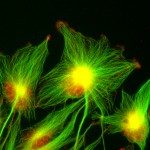Link to Pubmed [PMID] – 19928350
Adv. Exp. Med. Biol. 2009;656:30-40
Adenomatous Polyposis Coli (APC) is a tumor suppressor protein involved in the initiation and progression of colon cancer. The most widely accepted function ofAPC is to participate to the Wnt signaling pathway, by downregulating beta-catenin and thereby controlling gene transcription and cell proliferation. However, APC is clearly a multifunctional protein whose loss contributes to tumor formation in multiple ways. Regulation of APC localization during cell migration and the ability of APC to bind multiple polarity proteins and microtubule-associated molecules support the idea that APC plays a key role in directed cell migration and that this function may contribute to its tumour suppressor activity.

